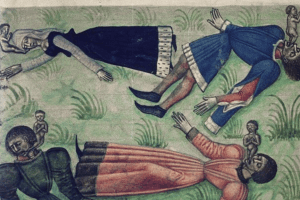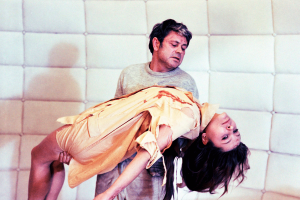«For something to be art, it must meet certain conditions. One of them is that it not be real; it must be fiction, discourse. Artists use images that are not entirely familiar. Something stands out and points out that this object is trying to mean something, to say, to offer a constructed sensory experience. Its existence is possible only through the transcendence of instinct, and in the affirmation of the individual as autonomy. As a result of the anguish implied by emancipating oneself from the dominant forces in order to assume not only a critical position but also an individual one, art expresses itself in a particular condition of instability, which evokes and convokes at the same time; it exhorts an experience of emancipatory and empowering freedom –that is, the exercise of effective freedom.
Freedom, of course, is not absolute, total or full, and it is highly conditioned by influences we fail to notice. If autonomy is desirable, how can there exist an order and a State without the control of a power that annuls our judgment and moral capacity? Without a power that designates what is right and what is wrong? How do you have a country without a motherland? Is manipulation a necessary evil of humanity?
The ability to fictionalize is what makes us human. All cultures have had symbolic systems that interweave with reality, and it is from this everyday life that fiction acquires life, its own body. The ability to fictionalize is related to that of listening and reading. The individual who seeks plenitude is given a legacy, plagued with some embarrassing things and other very valuable things; some she will admire –even if with hatred or pride–, others she will desire, or find exciting… Though she knows herself to be precarious, vulnerable and violated, she is willing to live, to express her will. And this is not essentially about the need to share (that comes later), but about the movement that arises from the urgency to feel strong, and to see before you something that was in your feelings, your thoughts or your nothings. Although an artist might be speaking from a place of depression, she is speaking, and if she is talking –even while wanting to die–, then she is not dead. She may have suicidal inclinations and eventually succumb to that force, or she may feel empowered in the act of death and, quite consciously, decide to die; then, even in death, she can express her will.
The will is the foundation of freedom, and freedom does not exist without constructing the individual’s integrity. Art in its pure state is just that: the evidence of an experience of profound transformation that is capable of transmitting its own sensation and, therefore, becomes exhortation. This is where the Other comes in, along with the urgency of sharing that has been discussed so often since antiquity.
When you make art, your primary urge precedes any philanthropic impulses, any necessity to share or socialize the philosophical or transcendental discoveries of one’s own being through the exercise of one’s judgment. But then the urgency of sharing emerges, and from that moment the work is born: an object capable of meaning and which, in fact, means. Art generates confrontations within the individual, it complicates because it provokes, confronts. The artist wants to correspond with herself, and that is why she responds to self-demands, sets self-imposed limits, tries to be self-critical, tries to get rid of sentimentalisms so she can continue to research artistically. Each work is a testimony of an event of freedom: it evokes and convokes from the declaration that freedom is possible, that it exists –even if fleeting, incomplete, and unstable, it exists.
The body, the idea of the body, and the notion of one’s own body are axes of art. The inclusion of the artist within her own work is a political statement. One must resist a force that pretends to impose itself, and in that resistance, one gains powers towards the materialization of one’s own will. But you can never assert your will without renouncing your bosses, masters, parents, or superiors –even your gods. Surely you have argued with God and won. Your destiny is only your origin, and you can always alter that.
You can change the destiny inflicted by your origin: you can get rid of your legacy, of inherited prejudices, male chauvinism, homophobia, transphobia, racism, and xenophobia. These are tedious ancestors, historically condemned to perish in the boilers of human shame. You have to imagine, visualize possible realities, predict that you, too, could commit a stupidity similar to that of your ancestors and that you might have to get rid of many mental parasites inserted during your childhood. You could be perpetrating an idiocy like racism without noticing… but which one might it be? You are not able to see it just yet because you are still to figure it out, but surely the moment is very near. This forces you to be even more alert, to be able to tell on micro-racism, micro-sexism, or other forms of expression of prejudice that, in the long run, define your relationship with your environment. Language models.
It is no coincidence that some words are insults. Semantic displacement is not arbitrary; it underlies an unconscious choice, plagued by ghostly images of memories and fantasies that offer an oracle to the psyche. Through supposedly innocent words, which do not mean to offend (but in fact they do), language strips and shapes a human being.
The bureaucrats that plague the world will want to convince you
That you work for free
Do not admit it
Governments like
To bathe in your vital sweat
There is a sewer and it is your scent what covers it
They want to beautify themselves with you
They want you to be their jewelry
They want you to be their sparkle
Because they are up to their necks
They instrumentalize your name
Your reputation
Your vital pulse
They kidnap you
They kidnapped the symbols and the memory
They want to tell you what to do to you, that you are an adult
They want to reduce your life to paperwork and queues
They want to reduce you to an alleged job
They want to impoverish your judgment
And cheapen your reputation
It takes a NO
There is a NO between you and them and that NO grounds you
The scream appears
It complains and cries
It leaves and protests
It is undone and it is rebuilt.»
This text gathers performance artist Érika Ordosgoitti’s intervention during IN-TRANSIT: Fields in Conversation, a talk and discussion around the exhibition Powers Seen and Unseen at Hacienda La Trinidad Parque Cultural, on November 5th, 2016.
About the artist:
Érika Ordosgoitti is an artist and cultural manager. She develops her work through declarations of freedom, as she offers testimonies of acts of autonomy. She attempts to detonate situations of moral discomfort from the body, marking it as a social space in conflict, a place of resistance, and a first vehicle of emancipation and empowerment. Her work regards performance as the most abstract and polyglot form of poetry; thus, her videos and photographs are conceived in terms of action. She makes use of social networks and the Internet to distribute her work, and she studies the mechanisms of censorship that manifest in them. She plays with scandal, disgust, tension, aversion, discomfort, shock, brazenness, and laughter.

















